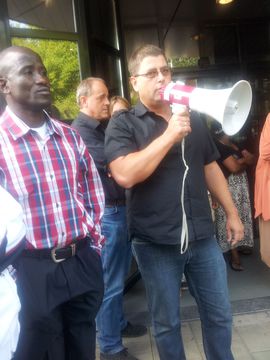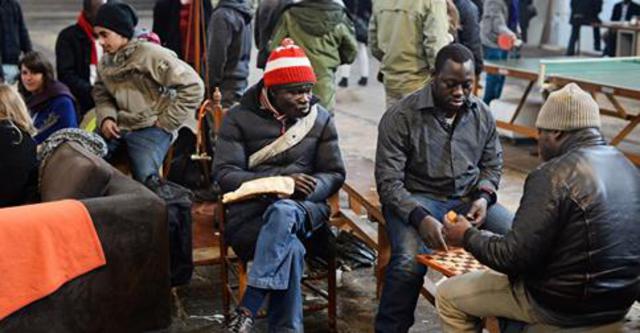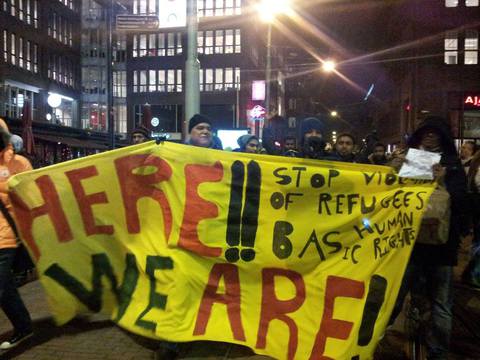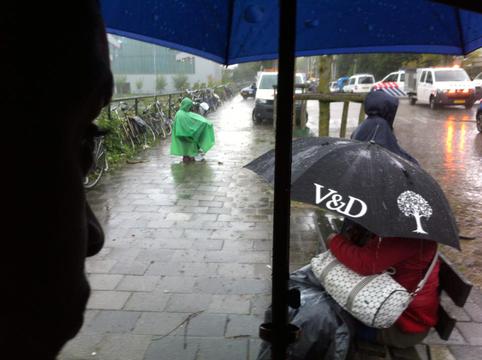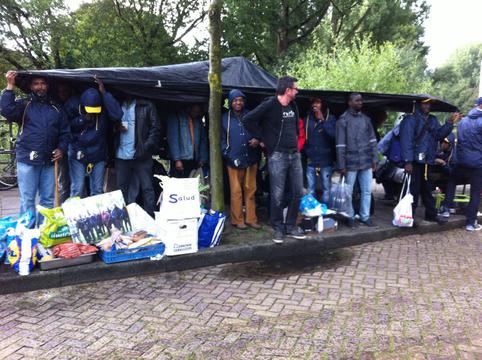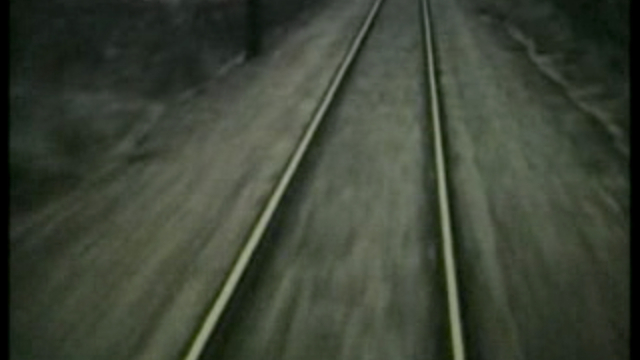Search results for 'refugees'
We ARE HERE
Welcoming the Iraqi Invasion Act
On the occasion of the action by refugees-on-the-street who started a camp outside the Collective Center at Ter Apel in the north of the Netherlands on the 8th of May, Jo van der Spek of M2M wrote the following column. These migrants are supposed to return voluntarily to their country, because the Dutch government believes that they are not in danger there. However the governemnt in Iraq refuses to take them back if they are forced. So they have nowhere to go to, no right to be here and no way to go there. But they act together for a chance to live and live better than before. Why not?
ReadNo One is Illegal - Principles
The No One is Illegal campaign has two goals: to attain concrete victories for immigrants and refugees and to develop the communities' own capacity to attain justice and dignity for themselves and their families. We strive and struggle for a world in which no one is forced to migrate. We also strive and struggle for a world where people can move freely in order to live and flourish in justice and dignity.
ReadThe wind of the South - UniCommon march to Tunisi [7-12 April]
We are students, precarious, unemployed, a young generation that is too much skilled for a job... We are the 'generation without future' of a Europe in crisis that we don't like and we want to change. We are students of Rome and London who have taken the streets to reclaim a better future.
ReadJadaliyya Launches DARS Page: Daily Acts of Resistance and Subversion
The DARS Page chronicles daily acts of resistance and subversion (DARS) in contemporary Arab societies and beyond. All forms of resistance and subversion to political, economic, social, or cultural forms of exploitation will be of interest. This includes resistance to authoritarianism, occupation, imperialism, and social norms, and the many ways these are subverted.
Readstateless plug-in
The 'stateless plug-in' is an extension for your browser that intervenes in digital territory, transforming the issue of stateless people into a multifaceted digital mapping of existing knowledge and information on the Internet.
ReadEscaping Assad and Revolution in Rojava
An interview with a Syrian activist in exile, code-named Sami, published by Occupy.com draws attenton once more to the radical experiment in real-life bottom-up matriarchal democratic design unfolding against all odds in the autonomous Kurdish region of Rojava in Northern Syria. We are republishing two short texts here on this subject matter to speculate about the question if 'Rojava' could offer a repeatable model for post-governmental political design?
I DON´T REMEMBER
Can Internet technology still revolutionize activism?
One of the biggest promises of the Internet was the transformation of political activism. No longer would change come about solely through the actions of large organizations, claimed the Web's early enthusiasts. Now, they claimed, individuals could rouse the concern of their fellow citizens for a particular cause through Web sites, e-mail, and online petitions. Those who normally shunned demonstrations and limited their participation in the public sphere could be contacted personally in their e-mail box, and all that would be necessary for them to do to show their support would be to click a button or fill in a field. Soon, pundits predicted, there would be a revolution in grassroots participation in the political process.
Readmake world paper 3
Two years after 911 the global cup looks both half full and half empty. It's hard to be optimistic, yet there are plenty of reasons for it. With the Bush-Blair war machine running out of steam, the movement of movements shifts its attention to alternatives for the WTO, Security Council and similar post-democratic bodies. In the moral desert of the Iraq War the structuration of imaginary consent through the repetitive bombardment of the image began to show severe cracks in credibility. These discrepancies within the represented result in a heightened need for action. The Iraq war didn't fool any one and both sides are still reeling a little from the shock. While maintaining their anger, people moved on from protest to a collective search for that other, possible world. What might a global democracy look like? Would it be a system with representatives and 'rights,' or rather a dynamic set of events, without higher aims?
ReadA Brief History of the Noborder Network
It wasn't exactly the right place nor really the right time to launch a political campaign which publicly called for a series of offenses against the law, yet when the call "No one is illegal" went out exactly five years ago at documentaX, the usual reservations counted little. In the Orangerie which had been temporarily arranged as a media laboratory, at the end of the visitors' course of the well-known Kassler art exhibition, a dozen political and media activists from all Germany's bigger cities met up at the end of June 1997 in order to publish an appeal.
ReadThe Art of Campaigning
The idea for the Art of Campaigning topic originates from the works of
the McLibel group [www.mcspotlight.org]. Their type of net.campaign
questions previous forms of activism, which was focused on the mass
media and their ability to influence public opinion, by staging direct
action (targeted at known media makers). Big NGO's such as Greenpeace
have built up experiences with this model for decades. The scenarios
they use have not changed much since the seventies. There is the usual
PR material: official reports, books, folders, flyers, magazine and
original video footage, shot on location. Campaigns are being planned
long in advance. The way of working does not differ much from a
campaign to launch a new product. Professionalism has taken over the
task of volunteers. Their role is being reduced to that of a local
support group, doing the actual grass roots work with the population.
Islam and Tactical Media in Amsterdam
Essay written in August 2002 for the New York University Tactical Media Lab, organised by the NYU Center for Media, Culture and History.
WE ARE HERE evicted once again - Amsterdam refugee scandal continues...
situation in vluchtschool
Dear followers and supporters,
Thank you very much for your support of more than two years, for everything you brought and you keep on bringing to us. Now that we have a hard moment than before, Now that we are tired and sick, now that the government is punishing us and now that we cannot go back to our respective countries, we turn ourselves towards you, the people of the Netherlands. Knowing that we cannot stay here, and we cannot go to other EU countries due to the EU Dublin's agreement (law) what are we going to do? We need politically your support more than before.
The ABC of Tactical Media
Tactical Media are what happens when the cheap 'do it yourself' media, made possible by the revolution in consumer electronics and expanded forms of distribution (from public access cable to the internet) are exploited by groups and individuals who feel aggrieved by or excluded from the wider culture. Tactical media do not just report events, as they are never impartial they always participate and it is this that more than anything separates them from mainstream media.

